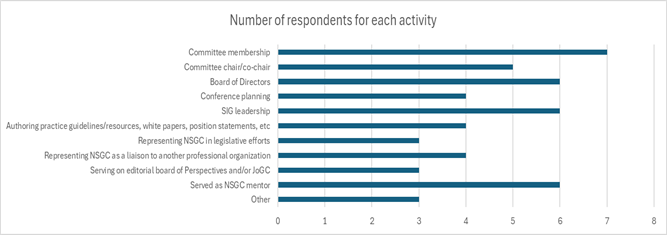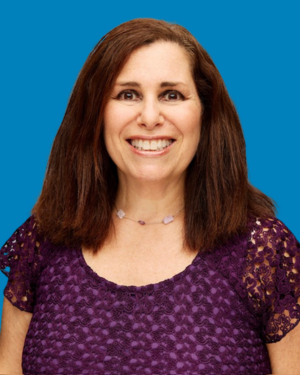The article below reflects the personal opinions of the author(s) and does not reflect the views or opinions of the Perspectives editors or committee, or the National Society of Genetic Counselors (NSGC).
During a recent meeting of the Late Career SIG, one member said she had been hearing that some genetic counselors who are earlier in their careers were considering dropping their National Society of Genetic Counselors (NSGC) membership because they felt they weren’t getting enough out of the organization to justify the cost. Another member or two confirmed that they had heard the same, and we considered this carefully. Why, we wondered, would younger members only be thinking of what their organization could do for them, rather than what they might be able to do for their professional society? Or at the very least, could we express to them how our NSGC involvement has shaped our careers and why it has been very emotionally and professionally important to us?
We developed a short survey for Late Career SIG members to discover what those of us later in our careers (or already retired) felt our membership gave to us throughout our careers. What we found was exactly what we expected: those of us who have been heavily involved in NSGC feel a very strong connection to the society, the networks we have built, the mentorship we’ve been able to gain and give and the friendships we cherish. We have been able to advance our careers through publishing research, writing practice guidelines, serving on every committee imaginable, mentorship activities, liaison positions, legislative action, conference planning and serving on the NSGC board as well as the boards of many other genetics organizations.
We fully recognize that members of our SIG are a biased sample of genetic counselors who have valued their NSGC community enough to be involved over decades, but there is value in summarizing for early-career GCs what they may not have considered. Eleven SIG members answered the survey: nine (82%) have been genetic counselors for over 30 years and two (18%) have been genetic counselors for 20 - 30 years. Eight of these individuals (73%) have been members of NSGC for over 30 years and three (27%) for 20 - 30 years. We asked what NSGC committees or activities they have participated in throughout their careers, with the following results:

When asked if they have experienced any barriers to participating in NSGC activities, 10/11 (91%) said no. One participant (9%) said yes and explained that, “when people already know each other, they are less inclined to invite new people to participate in social encounters. So being on a committee or at meetings can feel very isolating.” Respondents were asked how volunteering for NSGC has helped their careers in terms of faculty appointments, networking, job opportunities, etc. Comments included:
- "Volunteering with NSGC provided opportunities for professional growth that were not offered through my ‘day’ job. However, the skills I learned and the friendships I made through NSGC allowed me to grow and excel in my work environment. For example, volunteering with the annual Education Planning Committee and learning the logistics of planning a major conference, afforded me the skills I needed to propose putting on large educational conferences within the institutions I worked. The friendships and networking opportunities through NSGC gave me the confidence to take on new projects I never thought I would do."
- "Deepened knowledge of subject areas (professional development, education) and leadership, faculty appointment and advancement, networking and received awards."
- "The first decades of NSGC were ground-breaking! We literally built the infrastructure of our profession through NSGC….The sense of legacy and contribution to the genetic counseling profession is no less incredible to me now."
- "Being able to call a fellow NSGC member to share ideas and thoughts about grants and the initial development of the genetic counseling assistant position changed my career trajectory."
- "When I received a call from a publisher asking if I would be interested in writing a genetic counseling-focused text, I immediately called a colleague for ideas. Within a 10-minute phone call, we had not only identified the subject matter for the book, but numerous authors for the various chapters. We knew the people and their expertise, and what came out of it was a text that is still used in GC training programs more than a decade later. Without my NSGC connections, none of that would have been possible."
Respondents were asked how belonging to NSGC has been important to them and their careers. Answers ranged from being part of shaping and giving back to the profession to the development of professional skills and network of colleagues, opportunities for learning and advancement, and national relationships and projects. Other notable responses included the following:
- "Especially in the early days of my career, it was very important in order to stay connected with other GCs when so many of us were working alone."
- "My friends in other areas of healthcare are amazed at the comradery of our profession. This would not be possible without NSGC. My friends that I have made through NSGC are like family. I feel that I know at least one genetic counselor in all the major cities that I could contact for my patients or advice. This has been because of my involvement with NSGC."
- "I think it's important to be connected to the voice of the profession -- to gain from the collective wisdom via Perspectives and other publications, to hear how best to advocate for our profession, to learn from and help others via the listserv posts, to feel supported in our unique areas of the workforce, and to also be in the loop when issues come up that might run counter to my opinions/values and thus be able to speak up about them."
- "Through membership in the organization and participation in committee and Board activities, I have come to know genetic counselors from across the country. We helped advance our professional roles and developed friendships in the process. Instead of working only with colleagues at one hospital, I developed a network of individuals nationally who shared common interests and professional goals."
- "As a new grad, being a member of NSGC assisted me in establishing a new role for the GC and creating a network and name for myself. Having my thesis work chosen to present at the NSGC conference allowed me to meet other GCs interested in my topic thereby creating a network of like-minded GCs. I called upon these GCs to present at any and all genetics organizations conferences spreading the word of this new position. I called upon these GCs to be the founding members of the ART & Infertility SIG I founded. This involvement in NSGC allowed the executive directors to know me and call upon me to serve on the BOD as chair of the Education Committee and as liaison to NCHPEG. I was able to serve a president of NSGC to represent us on a marketing campaign in NYC. This involvement so early in my career gave me a network of mentors, guides and friends that serves me to this day."
- "Through NSGC, I have found a lifelong group of friends, colleagues, mentors and experts. These are people I could call upon at any time."
To the question of what professional development members had accomplished because of their NSGC membership that they would not have been able to accomplish without it, respondents noted organizational, editorial, leadership, budget development and grant-writing skills, as well as “endless” learning opportunities. One respondent discussed founding a SIG, creating, chairing and presenting short courses, and being a member of the NSGC Board of Directors. Another said she served on various professional boards, which raised her national profile, and that winning a national award was “a factor in local teaching award and teaching academy acceptance.”
Finally, we asked what advice members would give to younger GCs or those newer to the
profession about the value of membership in NSGC. The point was raised that there is a “snowball effect of volunteering,” that “one stint qualifies you for other opportunities.” Getting involved, another said, allows one to create a personal network and support system, and establish oneself within the profession. Respondents also noted that members can volunteer for just one role a year, and that if we all participate in just one project or help with one committee, it will continue to grow our profession. Our profession would not be where it is now without a history of members giving back.
One member pointed out that, “if you're new to the profession, it's beneficial to be connected, for support, knowledge and advocacy. If you then decide you're dissatisfied with the ‘product,’ you can speak up about it, rather than not knowing and not being able to effect change. If you have financial challenges to membership, let the higher-ups know why you're not joining.”
And in fact, there are some scholarships available for those who have a financial hardship and/or whose membership dues are not covered by their employers. Perhaps the most impactful response was to “JOIN AND PARTICIPATE!!! It is not about the dues. It is about what you will learn from the creativity, talents, experiences, inspiration and expertise of your colleagues. If you have an idea, jump in and make a suggestion. Think outside the box and take the lead.” We could not have said it better ourselves!
If you need any further convincing, take a look at this wonderful video.

Janice Berliner, MS, CGC is the director of the Bay Path University MSGC Program since 2018, before which she was a clinical genetic counselor for nearly 30 years. She earned her MS in human genetics/genetic counseling from the University of Michigan, and has served on the boards of directors of the National Society of Genetic Counselors (NSGC) and the American Board of Genetic Counseling (ABGC). Throughout her career, Berliner has supervised a sizable number of genetic counseling graduate students, has served as the Executive Editor of Perspectives, has been on the editorial board of Perspectives and the Journal of Genetic Counseling, served on/chaired several committees of the NSGC and GCEA (Genetic Counselor Educators Association), and chaired the 2008 NSGC Annual Education Conference. She has written several book chapters, published a number of scholarly articles and edited a book entitled "Ethical Dilemmas in Genetics and Genetic Counseling: Principles through Case Scenarios" (Berliner, 2014). She has published two genetics-themed novels, "Brooke’s Promise" and "In Good Conscience," and is working hard on her third (janiceberliner.com).
Ginny Corson, MS, CGC Ginny Corson, MS, CGC, retired in 2018 from Johns Hopkins University School of Medicine, where she was a prenatal genetic counselor and associate professor in the Department of Gynecology and Obstetrics. She served as president of NSGC and ABGC, in addition to other roles in those organizations. Corson has enjoyed staying in touch with genetic counseling colleagues across the country in retirement through the Late Career SIG.